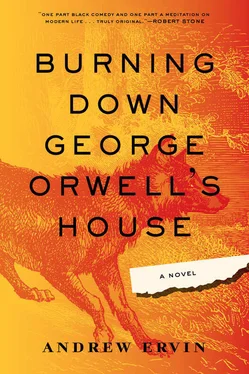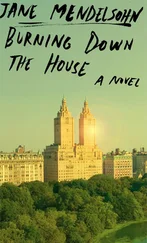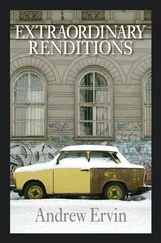“What the fuck are children doing at the bar?”
“I can get by nicely without Detroit.”
“Better.”
Ray had only drunk one beer and already had to piss. Television screens throughout the bar beckoned to him from every direction; some were hooked up to cable and others to a satellite, and the difference created a time warp in which a slap shot bounced off the goaltender’s chest protector and then five seconds later did so again on another television. More screens were mounted on the walls above the urinals. He went back to his seat to find Bud conspiring with Lily. She left to help someone else before he could sit.
“Are you aware that you look terrible?”
“You could at least act surprised.”
“Still not sleeping?”
“Not really. I need a vacation.”
“That’s a great idea. Here’s my advice. Since Helen’s totally about to divorce your ass, you should—”
“Helen is not about to divorce my ass.”
“You’re joking, right? Of course she’s about to divorce you. Everybody can see it except you. Lily can see it. Instead of sitting around whining and waiting for her to take half your money — hell, she already got your condo — you need to start spending it. Take a vacation. Go on a cruise. Get yourself rocked gently to sleep at night knowing you screwed Helen out of the pleasure of screwing you. Speaking of which, while you were in the bathroom Lily asked me what your deal is.”
“No she didn’t.”
“I’m serious.”
“What did you tell her?”
“That you’re gay.”
“No you didn’t.”
“I did, actually, and I got us some whiskies.”
As if summoned, Lily returned with two glasses of scotch.
“I’m not gay,” Ray said.
“Excuse me?”
“Bud said he told you I was gay.”
“He said you were in the middle of a ‘marital schism.’ Is that what you called it? He also said that your wife is about to divorce your mopey ass. Your being gay is news to me. Not that I have any problem with that. Enjoy your whiskies — they’re on me.”
“I’d like to be on her,” Bud said.
Before it occurred to him that perhaps he shouldn’t be drinking hard alcohol in the middle of the day, Ray took a long sip. It tasted like a generic highland, ten or twelve years old. He fished a few ice cubes from a rocks glass and dropped them into his whisky with a tiny splash.
The bar filled up as the game progressed. The sports-star millionaires representing Chicago were in the process of losing to those representing Detroit. When Ray was a kid, the heated Detroit versus Chicago rivalry had reached epic proportions in his imagination. The gruesome fascination he once had for the hockey fights was now derived from the commercial interruptions. Those thirty-second spots were relics of a previous era, a halcyon time when the advertisements remained separate from the entertainment. Now, there were ads painted onto the ice and superimposed over the action on the screen.
The programs were the commercials. The programs had always been the commercials.
“Give me one of those napkins,” Ray said. He took a pen from the bar and tried to calculate the number of barrels of crude oil he was personally responsible for converting into greenhouse gases. He couldn’t do it. The mathematics were beyond him. He drank some more scotch that he did or didn’t order and then woke up the next morning on a bed with no sheets.
The smell of re-reheated coffee arose from a machine programmed to begin brewing at six A.M. and it roused him from another disturbing dream. Action movies of his own subconscious invention still flickered on his mind. Details gelled into focus. A foreign army had occupied his hometown. Some faceless regiment had appeared by rail in steaming sixty-foot-tall locomotive behemoths as streamlined and fearsome as the Italian futurists’ protofascist visions. The entire town had been conquered, the women raped and children forced into slavery. Smoke rose from what had been the church he had attended as a kid and where he and Helen got married.
His dreams were getting worse. The late-night alcohol wasn’t helping, but neither was its occasional absence. A full month of sleep: that was what he needed. A self-induced coma free from his own imagination.
His eardrums pounded hard enough to drive a galley of rowing, half-naked slaves over the horizon of the flat earth. He spent an hour adrift, clinging to the bare mattress for dear life while the coffee burned again.
He woke up around dawn, or he thought he did. From inside a cloudbank it was impossible to guess the time of day. It felt like early morning, but it was just as likely four in the afternoon. Maybe it didn’t matter. Ray had no need to go anywhere or do anything and so spent his first morning at Barnhill in bed. The house creaked and moaned around him. Waves of rain splashed against the windows. He fell back to sleep for another hour. His thoughts turned again to that putrefying animal on his doorstep. He pictured it starting to move and squirm back to life. At some point, he pulled himself out of the dirty sheets and padded downstairs. The curtains were open, but the house remained dark. He balled up some newspaper, got a fire going again, and put a pan of tap water on top of the stove.
He filled a big stew pot with water at the kitchen sink and put it on the fireplace. It would take a while. In the meantime, he went upstairs and turned the bathtub faucets all the way on. If he could carry the boiling water from the sitting room to the bathroom fast enough, he might be able to get a decent bath. He slugged back a dram of scotch while the water boiled. Then he drank another one and carried the pot upstairs. The bath was hot enough to set his blisters blazing, but it felt so good to scrape off some of the dry earth.
The rest of the morning or afternoon or whatever was spent drinking whisky and staring out the windows. That woman who had given him a ride on Islay was right: he didn’t need his wristwatch anymore. Time operated differently on the Hebrides. It didn’t matter what time it was. Every so often the wind would push the clouds aside long enough to offer a view of the sheep that grazed around the house and were impervious to the weather. It felt so … so … right to not be at work. Ray could picture the flocks of businessmen and bicycle messengers and nannies back in Chicago racing in straight lines in adherence to the tight ant-farm grid of those claustrophobic city blocks and reporting their precise whereabouts every five minutes to concentric circles of online friends they had never met. He was free of it now. He had sold his truck and everything else he owned — furniture, flat-screen, turntable, everything. What he couldn’t sell, he donated. What he couldn’t donate, he hurled into the dumpster behind the dry cleaner’s. His smartphone was at that moment leaking persistent, bioaccumulative, and toxic chemicals into Lake Michigan.
A shelf in the kitchen contained a row of guidebooks, histories, pamphlets, and a detailed survey map of Jura. The island looked to be about five miles wide and was shaped like a long, skinny oval of volcanic rock that had been bitten nearly in half by Loch Tarbert, the gaping mouth of which opened into the sound over on the Islay/Colonsay side. A previous tenant had circled Barnhill, but he couldn’t reconcile that name on the map with his presence here. It was too good to believe. All Ray wanted to do was curl up under a blanket and read Nineteen Eighty-Four yet again, here at the source, to see what new insights revealed themselves. He wanted to think. He wanted to do nothing at all. Other than that, his only goal was to see every square foot of Jura, to find the remaining wild goats and catch a lobster to eat. He wanted to drink gallons of scotch and climb the Paps. He would get to all of it soon, but first he needed to unpack before it got dark.
Читать дальше












